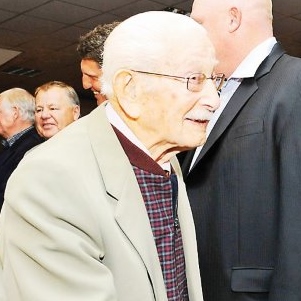click to dowload our latest edition
CLICK HERE TO SUBSCRIBE TO OUR NEWSLETTER


Published
5 years agoon
By
adminLUKE ALFRED
Alas, there aren’t any. Although some may have thought Adam Zampa, the Australian leg-spinner with the Justin Bieber-like good looks, is Jewish, he is of Polish descent, but not Jewish.
Closer to home, there have long since ceased to be South African Jewish cricketers capable of playing international cricket, although this wasn’t always the case.
The best story of all concerns Norman Gordon, nicknamed “Mobil” because of the slightly greasy brylcreem streaks of pomade in his hair.
For many years, Gordon, a fast-bowler born in Boksburg and educated at Jeppe Boys, was not only the oldest surviving member of either side who played in Durban’s famous Timeless Test of 1939, but the oldest living Test cricketer per se.
Aged 103, he passed away five years ago, secure in the knowledge that Wally Hammond, who played for England in the Timeless Test, talked of him the same sentence as England fast-bowler Maurice Tate, a compliment Gordon cherished.
To put things in perspective, Hammond was the greatest batsman in the world throughout the 1920s. A sublime technician who hit the ball hard, he was the Joe Root of his age.
That was until Don Bradman, a dapper Aussie from country New South Wales who favoured double-breasted, pinstripe suits started to grace the cricket stage. Some joked that with Bradman eclipsing Hammond as the pre-eminent batsman of his generation, the Englishman’s nose was out of joint for a decade.
Having earned Hammond’s respect, Gordon and the taciturn former England captain became friends during World War II, playing on opposing sides in games of social cricket designed to keep up morale.
Hammond was stationed at times in South Africa, and finally settled in Kloof outside of Durban, marrying a Durban socialite and former “Miss Hibiscus”, Sybil Ness-Harvey.
Gordon lived for cricket, he once told me, so much so that it compromised his studies at Jeppe Boys, and he earned his matric at least a year later than he probably should have.
During the Timeless Test – a Test lasting so long that the South African, Ken Viljoen, had time for two haircuts before it ended – Gordon bowled 92.4 overs. In those days, overs were eight balls long, which meant that he bowled the equivalent of approximately 120 overs by today’s six-balls-per-over standard. “It was so muggy that the front of my cricket whites were sticking to my legs below the knee I was sweating so badly,” he told me in one of several interviews he gave me through the years.
Those 92.4 overs weren’t an easy, wicket-taking romp by any stretch of the imagination. Gordon took only one all match: that of batsman Eddie Paynter, caught by keeper Ronnie Grieveson in the England second innings for 75.
When canvassed by the International Cricket Council (ICC) many years later on the subject of re-introducing timeless tests as a way of deciding a Test championship, Gordon was aghast. “I hope nobody has to go through something like that again,” he told them.
Gordon was Jewish but, unlike Jewish cricketers of earlier generations, wasn’t required to name-change or disguise his ancestry. Many didn’t realise, for example, that Sid O’Linn, a double Springbok in both cricket and football, came from a Jewish family of Polish descent called Olinsky.
O’Linn’s father was a kosher butcher in Oudtshoorn in the Karoo, according to a 2017 article by Daniel Lightman in the Jewish Chronicle. The family later moved to Cape Town, Sid matriculating from Sea Point Boys’ High as it then was.
Charlton Athletic was the club destination of choice for South African footballers of O’Linn’s generation, and he duly went across to London in 1948, spending 10 happy seasons at the Valley.
His contract ran to 60 pages, and stipulated that there was to be no dancing or drinking after Wednesday nights (football was on a Saturday) and riding a bicycle or motorbike was frowned-upon. Ice-skating was expressly forbidden.
In the English summer, O’Linn, an obdurate left-hander, played country cricket for Kent. His progress was erratic and, returning to South Africa, he did so well in a Test trial for the 1960 Springboks to England that, according to his good friend, Johnny Waite, “the buggers were forced to pick him”.
O’Linn and Waite later became part of the dapper duo who ran LF Palmer, a sports shop originally in the Joburg CBD before it moved to a nook inside the Wanderers Stadium.
Many a slightly wide-eyed Joburg schoolboy of the 1970s and early 1980s bought their cricket equipment from Sid and Johnny. It was an outing looked forward to for days. Little could I have guessed then that O’Linn, often dressed in a trademark lamb’s wool cardigan and Hush Puppies, was not the self-contained Irishman I thought him to be.
